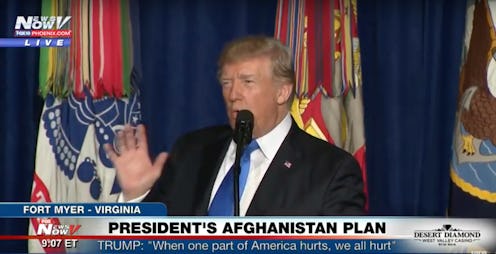News
Trump Refused To Reveal Whether His Afghanistan Strategy Involves More Troops

On Monday evening, President Trump announced that the United States will change its big-picture strategy in Afghanistan and throughout South Asia. But if you're wondering exactly what Trump's new Afghanistan strategy is, you'll have to keep wondering. Although the president spoke a lot about what America won't be doing in the 16-year-old war, he didn't announce a single specific policy change in his speech.
The closest the president came to unveiling a new policy was his declaration that the United States "will not talk about numbers of troops or our plans for further military activities" in the country.
"Conditions on the ground, not arbitrary timetables, will guide our strategy from now on," Trump said. "America's enemies must never know our plans or believe they can wait us out. I will not say when we are going to attack, but attack we will."
To be sure, this is a change in White House policy: Generally speaking, presidential administrations will announce troop increases or decreases in advance, especially in major, highly-publicized conflicts. And yet Trump said nothing about what the U.S. military will actually be doing in Afghanistan. He simply announced the White House won't say what the military is going to do before it does it.
Trump also said that "another fundamental pillar of the new strategy is the integration of all instruments of American power, diplomatic, economic, and military, toward a successful outcome." But that's not a new or different approach. In fact, it's so old that there's an acronym for it: DIME, which stands for Diplomatic, Information, Military and Economic. President Obama's national security advisor Susan Rice endorsed a variation of that approach in 2015, when she said that the United States will approach conflicts "using all levers of our power — vigorous diplomacy, broad-based development, economic leverage, our technological advantages, the talent and diversity of our people, and, when needed, our military might."
This isn't to say that DIME is a good strategy, or a bad one. But it definitely isn't a new one.
Lastly, Trump said that America "will not dictate to the Afghan people how to live or how to govern their own complex society," and that the United States is "not nation building again." But again, that's an announcement about what won't happen, not what will.
It's possible that Trump will send thousands of more troops to Afghanistan. It's equally possible that he'll pull thousands of troops out. Maybe, he'll keep troop levels at exactly where they are (which is around 8,400). Until the White House makes an announcement one way or the other, nobody but Trump knows.